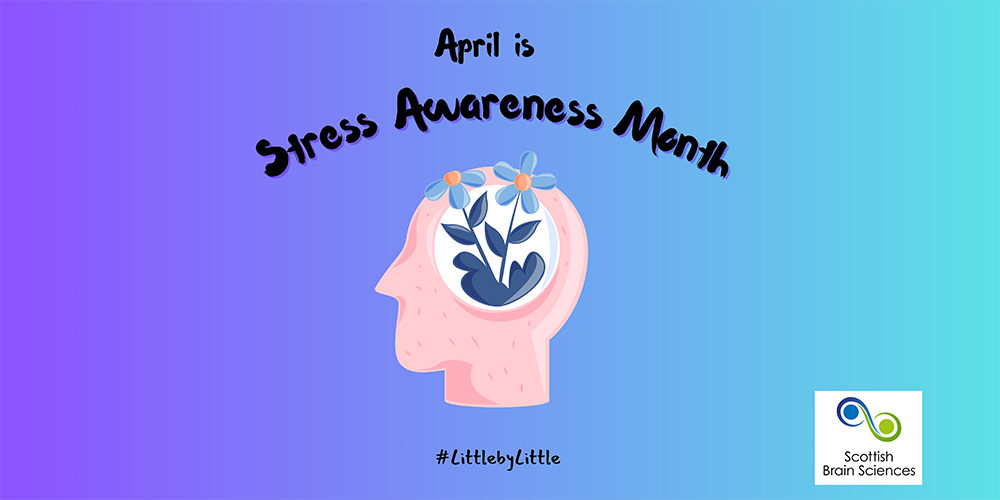SBS celebrates Stress Awareness Month
Published on 09/04/2024 by Scottish Brain Sciences

April is Stress Awareness Month, and the theme for 2024 is “Little by Little,” so let’s take a closer look…
We know that stress can affect everything. You might find yourself snapping at people when you would ordinarily be calm and patient. You might notice that you’re biting your nails, or you seem to lack concentration, have difficulties sleeping, or notice changes in your appetite. Stress can absolutely change your mood, your body, and how you see the world around you.
And now we are learning that stress can also affect the critical functioning of your brain not only today, but tomorrow, by contributing to the development of Alzheimer’s disease and other forms of dementia.
So, what does stress do to your brain?
Science is proving that stress can actually change the physiology of the brain, and this happens in several ways.
When you experience stress, the amygdala (an area of the brain that contributes to emotional processing) sends distress signals to the hypothalamus, which communicates with the rest of the body through the nervous system. These signals trigger a full-body “fight or flight” response to stress including increased heart rate, rapid breathing, and a great big rush of adrenaline. As a result, a hormone called cortisol is released, helping to steady the ship and replenish some of the energy lost in the body’s stress response. Under ordinary circumstances, once the event triggering the stress has passed, the cortisol levels in the body return to normal.
But how does stress actually contribute to Alzheimer’s disease?
While the actual processes are incredibly complex, the simple explanation is this: As a result of prolonged levels of this “fight or flight” reaction, called chronic stress, your body ends up making more cortisol than it can release or regulate. It’s these prolonged levels of cortisol that affect your brain’s ability to function properly. Your synapses can’t regulate, brain cells die, and your brain (especially your prefrontal cortex, responsible for memory and learning) can shrink in volume…all of which leads to increased risk of brain diseases such as Alzheimer’s disease.
There is some good news, though: stress has been named as one of 12 “modifiable” risk factors for Alzheimer’s disease and dementia. (You can read more about these modifiable risk factors here: https://bit.ly/3vX84ui )
Through this year’s theme of “Little by Little,” researchers are sharing that by applying small, manageable changes to your lifestyle and mindset, these small changes can make a big difference to your stress levels. And therefore, to this particular risk factor for dementia. What’s more, some of these changes to reduce stress – such as getting out in nature, becoming more active, keeping up your social network – can also affect several other modifiable risk factors on the list. Talk about a good deal! Who doesn’t like a health buy-one-get-one deal like that?
Throughout the month, we will be sharing some insights on stress, stress management, and how you can adopt the idea of “little by little” from our experts here at Scottish Brain Sciences. Just head over to our YouTube channel to join in on the conversation!
Latest news and research
 https://brainsciences.scot/wp-content/uploads/2024/07/GSq6-B_XgAAc-4Y.jpg
1600
2400
k.montano
/wp-content/uploads/2024/05/Scottish-Brain-Services-Logo-2024.png
k.montano2024-07-17 15:16:142024-07-17 15:31:19Deputy First Minister announces Scottish Brain Sciences as anchor tenant in ONE BioHub Aberdeen
https://brainsciences.scot/wp-content/uploads/2024/07/GSq6-B_XgAAc-4Y.jpg
1600
2400
k.montano
/wp-content/uploads/2024/05/Scottish-Brain-Services-Logo-2024.png
k.montano2024-07-17 15:16:142024-07-17 15:31:19Deputy First Minister announces Scottish Brain Sciences as anchor tenant in ONE BioHub Aberdeen https://brainsciences.scot/wp-content/uploads/2024/07/Pics-for-socials-6.png
788
940
k.montano
/wp-content/uploads/2024/05/Scottish-Brain-Services-Logo-2024.png
k.montano2024-07-03 09:38:322024-07-03 10:44:33New Alzheimer’s Vaccine Trial in Scotland
https://brainsciences.scot/wp-content/uploads/2024/07/Pics-for-socials-6.png
788
940
k.montano
/wp-content/uploads/2024/05/Scottish-Brain-Services-Logo-2024.png
k.montano2024-07-03 09:38:322024-07-03 10:44:33New Alzheimer’s Vaccine Trial in Scotland https://brainsciences.scot/wp-content/uploads/2024/06/testalize-me-0jE8ynV4mis-unsplash-1-scaled.jpg
1707
2560
k.montano
/wp-content/uploads/2024/05/Scottish-Brain-Services-Logo-2024.png
k.montano2024-07-01 09:35:582024-07-03 10:37:13Blood biomarkers can reveal Alzheimer disease progression, study finds
https://brainsciences.scot/wp-content/uploads/2024/06/testalize-me-0jE8ynV4mis-unsplash-1-scaled.jpg
1707
2560
k.montano
/wp-content/uploads/2024/05/Scottish-Brain-Services-Logo-2024.png
k.montano2024-07-01 09:35:582024-07-03 10:37:13Blood biomarkers can reveal Alzheimer disease progression, study finds

